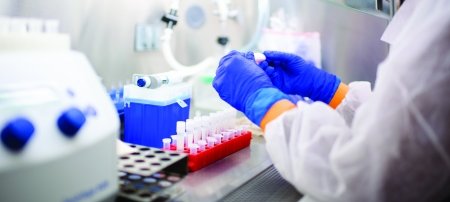Mathematics professor Qiuying Sha studies statistical genetics and is ready to do health by the numbers.
Sha is the new Portage Health Foundation Endowed Professor of Population Health. In her new role, she wants to make sure people aren't treated as numbers in a system—rather number crunching should work in favor of people's individual health.
"You can tell the person from the data," Sha says. "I'm a statistician, so when I apply for funding or pursue research it's always with data—and in this new role, I'll be able to help on data analysis-tell what the data says and find any patterns from the data."
Specifically, Sha plans to develop statistical models for personalized medicine—a practice where lots of genetic data, family information, and medical history inform recommendations for an individual person's medical treatment. Her work could also be applied to genetic screenings to help catch early signs of diseases and assist with preventative care.
"I'm excited about this position because it's not just about helping my own research it's about helping the local community."
Data in the Genes
Sha is joining health care specialists, inventors, movers and shakers to push for better health science in the Upper Peninsula through a $2.5 million grant from the Portage Health Foundation. Michigan Tech will match and exceed the grant, bringing the total to more than $6 million; the funds will support two other endowed professors focusing on health tech and community health. The five-year grant also makes scholarships available to undergraduate students, helps support graduate student positions and funds research to improve health infrastructure and economic growth in Keweenaw, Houghton, Baraga and Gogebic counties.
For Sha, she sees this as an opportunity to give back to her community.
"I moved here in 2001—so I've been living here for 16 years—and I'm happy to help make the community better, it's really exciting," she says. "I'm eager to work with local people and to see what I can do to help our community, to make the community better."
Specifically, Sha works in a field called genetic epidemiology. That means she applies statistical methods to genetic data to identify the genes responsible for a particular disease. She analyzes DNA sequences from the whole genome. Her work gets nitty-gritty: she looks at the building blocks of DNA—nucleotides—and variations that occur at key locations in the genome. These are called single nucleotide polymorphisms (SNP—pronounced like "snip") and there are close to 10 million SNPs in the human genome.
"So, we say, okay, let's find which genes are associated with a disease," Sha explains, adding that she targets the locations of causal SNPs in her analyses because they may indicate an increased risk of a disease. "But that's a challenge because our data, all those SNPs, become a very large dataset."
Big Data, Small Community
Once all the dataset is wrangled, though, Sha is able to study the risk for individuals and the prevalence of diseases in a given population. She has applied statistical genetic analyses to hypertension, type II diabetes, and neurodegenerative diseases like Alzheimer's and ALS.
"We live in the age of 'big data', and Sha's research can help us better understand if certain genetic and/or environmental factors are contributing to chronic diseases in our area," says Jason Carter, who is the lead researcher on the Portage Health Foundation grant and the Chair of the Department of Kinesiology and Integrative Physiology at Michigan Tech. "People ask me all the time—do we have a higher incidence of cancer in our area, and if so, why? These are the types of questions Sha can help us address, which will allow us to provide better and more targeted care and preventative interventions for our community."
Kevin Store, the executive director of the Portage Health Foundation, says Sha's background in statistical genetics research will bring a different perspective to projects.
"I was so happy to be able to have a conversation with someone that shares a passion for better using what the data tells us to make informed decisions on how and where we can provide financial support that will improve the health of our community."
By digging deeper into the numbers, Sha can help personalize medicine. The first step is decrypting the genetic code of diseases and their triggers.
Michigan Technological University is an R1 public research university founded in 1885 in Houghton, and is home to nearly 7,500 students from more than 60 countries around the world. Consistently ranked among the best universities in the country for return on investment, Michigan's flagship technological university offers more than 120 undergraduate and graduate degree programs in science and technology, engineering, computing, forestry, business, health professions, humanities, mathematics, social sciences, and the arts. The rural campus is situated just miles from Lake Superior in Michigan's Upper Peninsula, offering year-round opportunities for outdoor adventure.






Comments